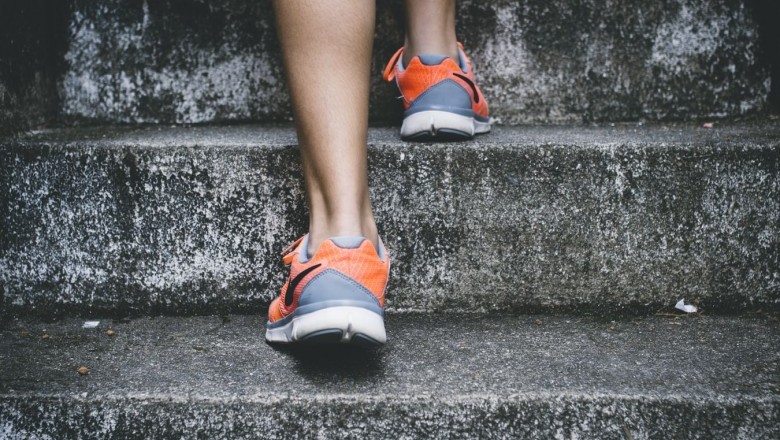views

What we do after a workout is sometimes just as important as the workout itself. Fail to cool down properly or nourish your body, and a lot of your training can go to waste. But by implementing simple and easy habits into your post-workout routine, it’s easy to boost your performance in the long term. In this article, we explore 5 great ways to improve your post-exercise habits.
Make sure to hydrate
Many of us underestimate how much water we actually lose when we exercise. Something as simple as a little run on a hot day could make you lose over 4 cups of water. So the first thing to do after exercise is to keep hydrated.
Water is the beverage of choice, of course. Don’t go for sugary drinks like soda or juice. However, you can go for drinks that contain a bit of added water, sugar, or electrolytes. These so-called “sports drinks” can help your body recover faster. They essentially replenish the minerals you’ve lost during exercise, helping you stay fit and healthy.
You may not be used to drinking so much water, but try to make an effort. Just one glass of water isn’t enough. Try to get at least a liter of water back into your system one to two hours after you finish exercising.
Stretch
We can’t overstress the importance of stretching. It may seem boring, but some sports coaches consider it just as important as exercise itself. The main benefit of stretching is that it reduces the pain and stiffness that often follows exercise. It also keeps your body flexible so that you don’t lose range of motion overtime. When we know how important range of motion becomes as you age, stretching regularly is key to a healthy, long life.
Stretching is also a very relaxing activity. If you can learn to enjoy it, you’ll find that the time after a workout is one of the most peaceful moments in your day. Combined with the post-workout endorphins, the happy molecules that are released when you stretch can feel very, very good.
Finally, stretching prevent injury in the long term. Athletes (and casual athletic people) who stretch regularly are a lot less likely to experience strained joints or pulled muscles. If you think of how much time you could be losing to an injury, a 10-minute stretch session isn’t a waste of time at all!
Undress and shower
Many of us come back from a workout exhausted, tempted to just sit on the couch for a while. But that can actually lead to a lot of problems if you don’t change your clothes fast. While science shows that sweating is good for you, staying covered in sweat actually isn’t. If you don’t get into the habit of showering after a workout, you could develop skin problems like body acne. The warm, moist environment of sweat-drenched skin is a literal dream for fungi and bacteria. And if you’re not careful, it could even lead to more serious problems like infections. So hop into a shower straight after coming back from the gym, your body will thank you.
Workout clothes also suffer when they stay drenched in sweat for so long. Overtime, they can start to smell or lose in elasticity. So after a workout, it’s a good idea to put them to dry straight away.
Rely on natural anti-inflammatory herbs and remedies
It’s no secret that strenuous exercise can raise your inflammation levels. This is what creates things like muscle cramps and sore muscles. That’s why it’s so important to stock up on anti-inflammatory foods after your workout. A few we can recommend are turmeric, green leafy vegetables, and hemp.
Turmeric is an ancient yellow-colored root with great anti-inflammatory properties. Add turmeric powder to your post-workout shake to enjoy its benefits.
Leafy green vegetables like kale and spinach are also great at relieving inflammation. You can enjoy them in a salad, in a smoothie, or in more elaborate foods like curries and pasta bakes.
Finally, the hemp plant is a treasure trove of anti-inflammatory molecules. The best way to use it to its full potential is to take CBD oil, a product that’s particularly rich in anti-inflammatory cannabinoid CBD. You can learn a bit more about all the other benefits of CBD oil in this article.
Make sure to get enough sleep
Your body recovers the best during sleep. So after a heavy workout, make sure you get the hours of sleep you need. Even if you usually function well on 7 hours of sleep, try to increase that number to 8 or 9 after a workout. You’ll be surprised at how much faster you recover from sore muscles and tense tendons if you just leave your body time to sleep it off!
After a workout, we naturally get deeper sleep. But if falling asleep is still an issue for you, you could try taking melatonin tablets before bed. They can increase feelings of sleepiness, helping you fall asleep faster. If you still need to wake up early in the morning, it can also be a good idea to take naps. Research shows that, when done well, naps can actually help our body recover a lot better.
All in all, getting enough sleep is key to maintaining a healthy body when you exercise. And as research has found, you’re also a lot less likely to experience injuries when you’re well-rested. So next time you get a very short night of sleep, think about easing up your exercise routine a bit!
Takeaways
To sum things up, after exercise, you should:
Take your clothes off and hop in the shower
Drink a lot of water or electrolyte-based liquid
Stretch carefully
Incorporate anti-inflammatory ingredients into your food
Get a long night of sleep
All of these steps will help your body recover faster. That way, you won’t wake up with painful sore muscles. They also ensure that you’ll keep on improving your performance overtime while reducing risks of injury. These habits take a bit of time, but they’re really not unpleasant to implement. In short, it’s a win-win!













